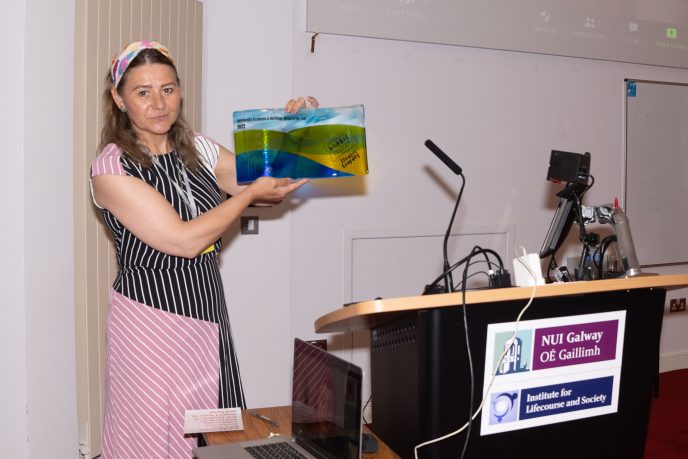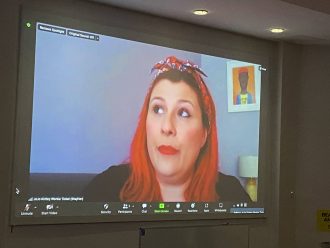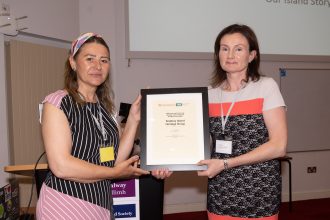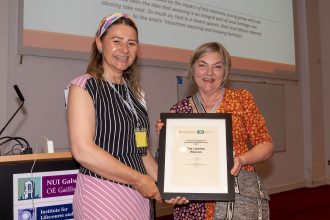The 2022 CAHG award winners are:
Overall winner and Wellbeing Category: Workie Ticket Theatre CIC
Tyneside-based Workie Ticket Theatre CIC is a female-led theatre company producing work across the North-East which reflects current social issues. It aims to amplify unheard voices by creating projects to work with disadvantaged groups and use drama as a tool to engage the socially isolated whilst exploring issues that affect their lives such as domestic abuse, sexual violence and discrimination. It is committed to creating real positive social impact through theatre and is passionate about archiving its work and making sure ‘herstory’ is preserved for future generations.

Audrey Wilson of CAHG holds the award for Community Archives & Heritage Group of the Year 2022, awarded to Workie Ticket. Copyright Boyd Challenger
Inspiration in the pandemic
The COVID-19 pandemic provided inspiration for the Womxn Up? Project, gathering North East women’s stories of the pandemic and sharing them through a podcast series and a film – ‘Her Primal Scream’. The aim of the project was to explore and amplify the experiences of a broad spectrum of women who live in the region and to share how they coped (or not!) in order to survive the pandemic. This work will be accessioned into the Feminist Library in London on 10th September in a special celebration and screening of the film to be held at Sojourner Truth Community Centre.
A second podcast series #AllMenCan explores misogyny and femicide in the North East- this came out of the research from the original podcast series and will also be archived.
Womxn Up? was funded by the National Lottery Heritage Fund and ‘Her Primal Scream’ by Comic Relief.
The judges said:
Workie Ticket are an example of ploughing through the pandemic and using it as an opportunity to engage and get people involved, using technology too, and showcase otherwise hidden voices. The podcasts and films show dynamism and a desire to keep progressing.
Artistic Director of Workie Ticket, JoJo Kirtley said:
We are thrilled to have been awarded both the Wellbeing Award and announced as overall winner. I am so proud of the Workie Ticket team who worked so hard to bring this project together. For us, heritage is not just our buildings and land, it is our stories. Far too often women are left out of history or they are not equally represented in museum and archives collections, especially working class women.

JoJo Kirtley of Workie Ticket, appearing via remote link at the CAHG 2022 awards ceremony. Image courtesy of Our Irish Heritage
Gathering and Preserving Heritage: Scattery Island Heritage Group
The Scattery Island Heritage Group (SIHG) came into being in 2012 with a view to preserving, honouring and sharing the rich and varied heritage of Scattery Island. To this end the group liaised with the Office of Public Works (OPW), and Clare County Council, as key stakeholders involved with Scattery, and opened up membership to the wider community in Kilrush and West Clare with a view to further preserving the heritage of Scattery, and broadening its recognition Scattery Island is a small island off the coast of County Clare in Ireland. Kilrush on the mainland is the closest town. The current Scattery Island Heritage group is partly derived from Kilrush Community Development (KCDL). Set up in the 1980s to improve the community in its widest sense KCDL became the prime mover in acquiring Scattery from Belgian owners in 1989, in collaboration with key stakeholders at the time.
Joined iCAN
SIHG joined the Irish Community Archive Network (iCAN) in 2019 and working in partnership with them developed a digital archive: Scattery Island Heritage – Our Island Story. The archive tells the story of Scattery Island, from St. Senan’s monastic settlement, to the maritime, agricultural and musical traditions of the Island. This work brings value to the local and wider community, making the heritage of Scattery accessible to all and enhances the work of local historical and oral history groups. A core part of the archive is that it invites contributions from the community, local, national, international, opening the door to heritage for all.
The judges awarded the Gathering & Preserving award to the Scattery Island Heritage Group for:
- Their work safeguarding oral histories, documents, photographs and artefacts relating to the Scattery Island community in the 19th and 20th centuries.
- Their plans to digitise and display the information.
- Their work with Irish Life and Lore on a project to capture new oral histories related to the Island.
- The work of group members working on replicating artefacts and furniture from Scattery to photograph, share and donate back to the Island via the OPW.

Audrey Wilson of CAHG with Eve Brennan, Scattery Island Heritage Group, winner of the Gathering and Preserving Heritage award, 2022. Copyright Boyd Challenger
Eve Brennan of SIHG said:
We feel that our work has been essential in recent times from a connectivity view, to capture and preserve a time in Scattery Island’s heritage that might otherwise be lost, or at best, fragmented. There are descendants of Island families and those who lived on Scattery whose accounts and memories of island life are an integral part of reflecting the living heritage of the Island in the 19th and 20th centuries.
Community Engagement: The Liberties Weavers
The Liberties Weavers is a voluntary community group dedicated to breathing new life into the 1,000 years of history, weaving and textile production in the Liberties, in the centre of Dublin. Since they began their work in 2020 they have woven their way into the hearts and homes of textile and local history enthusiasts in Ireland and abroad. They share their research on the textiles that were produced in the Liberties, and in the lives of the people who made them. They also encourage people of all ages and backgrounds to learn the craft of weaving and create new beautiful handmade textiles that reflect our lives in the 21st century.
An industrial working class
The Liberties is an area of Dublin 8 which has historically been home to an industrial working class and in recent decades, with the decline of the textile and other industries, a community that has become increasingly impoverished. Parts of the area are now described as ‘socially disadvantaged’.
Recent years have experienced a shift in population profile with many economic migrants and refugees and at the same time a wealthier element starting the process of ‘gentrification’.
Marja Almquist of the Liberties Weavers said:
Our project focusses on weaving history, but its underlying aim is community development. By raising awareness about the rich history of the area we are targeting all of the above groups, to build a common sense of pride and local identity.
The judges were impressed by the impact of this relatively young group who had already seen the idea that weaving is an integral part of local heritage and identity take root. For instance, at a recent opening of a new park the Lady Mayor, in her speech referred to the area’s ‘important weaving and brewing heritage.’ Four years ago textiles did not exist in the official narrative about the Liberties.

Audrey Wilson of CAHG with Marja Almqvist, Liberties Weavers, winner of the Community Engagement award, 2022. Copyright Boyd Challenger
Another success is that through lobbying local politicians they have succeeded in getting a mention in the Dublin City Development Plan (currently being drafted) on the need to establish a ‘local heritage and craft centre, anchored by The Liberties Weavers’. Other evidence that the messages are getting through can be seen in the naming of new public spaces, such as Weavers Park and a recently completed student accommodation building has been named The Loom.
Marja Almquist of the Liberties Weavers said:
We work to core community development values and practices, such as equality and inclusion. The important thing for all our students is not to make perfect weaving, but rather to enjoy the sociability of our events and to gain the confidence to explore their own creativity and family stories.

No Comments
Add a comment about this page